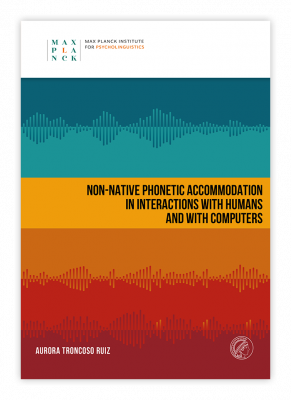Aurora Troncoso Ruiz will defend her thesis on Monday 13 June

Oftentimes speakers adapt the way they speak to our interlocutor. For example, speakers tend to change their pronunciation when we speak with someone who has a different accent. This phenomenon is known as accommodation and it can take place when we speak in our mother tongue but also in a second language. Nowadays, interacting with computers has become part of our daily life, given the vertiginous technological developments.
In this dissertation Aurora Troncoso Ruiz investigated why people accommodate to humans and to computers in the first place: do we accommodate because it is easier for us to repeat what we just heard or do we accommodate to make sure the interlocutor understands us? Results show that accommodation can be the result of both options but, interestingly, speakers accommodate more to humans than to computers as the result of repetition but more to computers when the communicative success is at risk.
Share this page